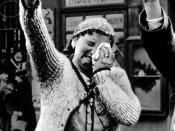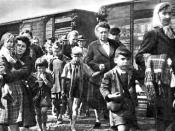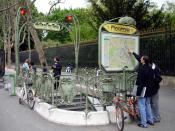The Blindness of an Ignorant Mind The play ?Incident at Vichy,? by Arthur Miller takes place in France during the Nazi occupation. The Germans have already started to pick up Jews in Paris and send them to what the people thought were prison camps. The main characters in the play suspect that they have been picked up by the Nazis for being Jewish. While they are waiting to be questioned confusion and chaos break out when a rumor is told of Nazis incinerating the captured Jews. Some people refuse to believe these stories; others except them for the truth. This decision is the difference between life and death. Through fighting the blindness of ignorance insight into the idea of the true nature of man is acquired.
Accepting the truth in the face of horror, Von Berg is given the opportunity to live. Von Berg believes in the stories he hears about the Germans burning Jews when it would be easier to push this idea out of his head and listen to the ideas of the scared men.
But instead of doing this, Von Berg stands strong, ?I find it the most believable atrocity I have ever heard. Because it is so inconceivably vile. That is their power. To do the inconceivable; it paralyzes us? (269). He points out to the rest of the men how the Germans plans are affecting them. By doing something so awful it, as he says, ?paralyzes? them from taking any action. They are being pulled in two directions and this is what paralyzes them. They want to stay with their families and in their own country because they feel that they are safe from such an act of violence. On the other hand, they want to escape this deadly Nazi hand that seems to be closing around their throats. Von Berg realizes this in its entirety and tries to warn the others.
?They do these things not because they are Germans but because they are nothing?the less you exist the more important it is to make a clear impression?a kind of truthfulness. After all, what is self-restraint but hypocrisy? ? I believe that in this fire; it would prove for all time that they exist, yes, and that they were sincere?What one used to conceive a human being to be will have no room on this earth. I would try anything to get out.? (270) Von Berg sees how the Nazis would justify these acts. By making themselves out as a dominant people. They don?t exist now as a people of strength but by doing this they will prove to the world what they really are. This makes perfect sense to Von Berg as a reason for the truthfulness of the rumors. He uses this insight and goes into questioning with this knowledge of what the German?s really are. Von Berg leaves the questioning with his pass to leave the building freely.
Rejecting the truth leads to the destruction of Monceau. Monceau can?t understand why the Germans or anyone would want to burn their work force. He uses numbers and figures to back up his statement. It?s number of the people that could have possibly been affected and concept of the act that he can?t accept.
? In my opinion you?re hysterical. After all, they were picking up Jews in Germany for years before the War, they?ve been doing it in Paris since they came in ? are you telling me all those people are dead? Is that really conceivable to you? War is war, but you still have to keep a certain sense of proportion. I mean Germans are still people. ? (257) Monceau doesn?t see this as an act that any human could possibly do to another human. His ignorance of the true intent of the nazi psyche is his downfall. He sees all humans as equal on some basic level. He can?t see how the German working class would allow this to happen and therefore refuses to except any input on the matter. He refuses to look at even the possibility of truth to the subject. ?I go on the assumption that if I obey the law with dignity I will live in peace. I may not like the law, but evidently the majority does, or they would over throw it.? (279) He feels that if he goes along with the law of the majority then his life is safe based on the idea that burning humans is an impossible law to practice. The people would not let it be practiced. He enters the questioning still in his ignorant state with a blind smile on his face and never leaves.
Through either excepting or rejecting the truth that the holocaust is going on, the men are either saved or lost. Von Berg understood how a man could do something so evil to another. He decided to question his own views on what the mind of a man really is and what it is capable of. This knowledge helped him escape his fate. Monceau believed that all men are inherently good. He refused to doubt or question the foundation of his beliefs on the mind of man and what man is capable of doing to his fellow human beings. These false belief leads to his unavoidable destruction. With the loss of ignorance, Von Berg gained life, but not without a penalty. ?What one used to conceive a human being to be will have no room on this earth? (Von Berg, 270)




